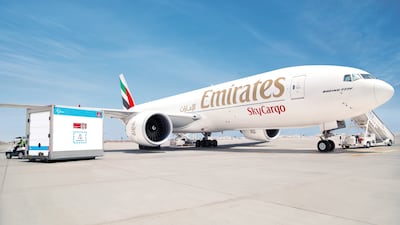Emirates airline's cargo arm transported more than one billion Covid-19 vaccines doses worldwide, in the 18 months after its first trial shipment of doses in October 2020.
More than 4,200 tonnes of Covid-19 vaccines, surpassing one billion doses, have been moved to over 80 destinations on 2,000 Emirates flights, Emirates SkyCargo said in a statement on Monday. Nearly two-thirds of these doses were transported to developing countries.
"The strategic location of our Dubai hub combined with the strengths of our modern fleet of wide-body aircraft, our purpose built facilities and capabilities in moving temperature-sensitive pharmaceuticals allowed us to transport Covid-19 vaccines securely, reliably and rapidly," said Nabil Sultan, divisional senior vice president for cargo at Emirates .
With the global expansion of vaccine production and distribution, Emirates SkyCargo transported larger volumes of Covid-19 vaccines from manufacturing centres, reaching 600 million doses by December 2021.
In addition to Covid-19 vaccines, the airline transports other critical medicines and treatments on its flights to more than 140 destinations across six continents.
An estimated 200 tonnes of pharmaceutical cargo are flown every day on Emirates aircraft.
Emirates SkyCargo also expanded its pharmaceuticals-handling capacity at Dubai International Airport last year.
The airline's fully automated cool room at its pharmaceuticals centre now provides an additional 2,600 square metres of temperature-controlled environment, of between 2ºC and 25ºC, for storing and handling vaccines and other medicines.
Global air cargo markets recorded slower growth in January as supply chain disruptions, capacity constraints and deterioration in economic conditions for the sector dampened demand, said the International Air Transport Association (Iata).
Global freight demand, measured in cargo tonne-kilometres, was up 2.7 per cent year-on-year in January, the latest Iata report showed. That was down from the 9.3 per cent growth recorded in December 2021.


